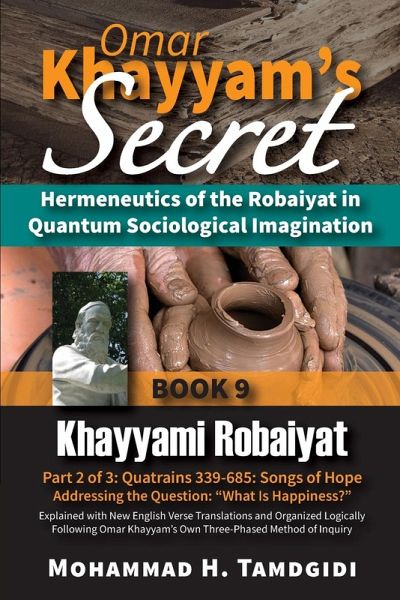
Omar Khayyam's Secret
Hermeneutics of the Robaiyat in Quantum Sociological Imagination: Book 9: Khayyami Robaiyat: Part 2 of 3: Quatrains 339-685: Songs of Hope Addressing the Question "What Is Happiness?": Explained with New English Verse Translations a
Versandkostenfrei!
Versandfertig in 1-2 Wochen
78,99 €
inkl. MwSt.

PAYBACK Punkte
39 °P sammeln!
Omar Khayyam's Secret: Hermeneutics of the Robaiyat in Quantum Sociological Imagination, by Mohammad H. Tamdgidi, is a 12-book series of which this book is the 9th volume, subtitled Khayyami Robaiyat: Part 2 of 3: Quatrains 339-685: Songs of Hope Addressing the Question "What Is Happiness?": Explained with New English Verse Translations and Organized Logically Following Omar Khayyam's Own Three-Phased Method of Inquiry. Each book, independently readable, can be best understood as a part of the whole series. In Book 9, Tamdgidi offers the second of a three-part set of 1000 quatrains he has chos...
Omar Khayyam's Secret: Hermeneutics of the Robaiyat in Quantum Sociological Imagination, by Mohammad H. Tamdgidi, is a 12-book series of which this book is the 9th volume, subtitled Khayyami Robaiyat: Part 2 of 3: Quatrains 339-685: Songs of Hope Addressing the Question "What Is Happiness?": Explained with New English Verse Translations and Organized Logically Following Omar Khayyam's Own Three-Phased Method of Inquiry. Each book, independently readable, can be best understood as a part of the whole series. In Book 9, Tamdgidi offers the second of a three-part set of 1000 quatrains he has chosen to include in this series from a wider set that have been over the centuries attributed to Khayyam. Part 2 includes quatrains 339-685 for each of which the Persian original along with Tamdgidi's new English verse translation and a transliteration for the same are shared. Each quatrain is indexed according to the frequency of its inclusion in manuscripts, the earliest known date of its appearance in them, the extent to which it has "wandered" into other poets' works, and its rhyming scheme. Brief comments about the meaning of each quatrain in relation to other quatrains and works attributed to Khayyam are then offered along with any notes regarding its new translation as shared. Tamdgidi shows that the quatrains 339-685 address the question "What Is Happiness?" The latter is the second of a set of three methodically phased questions Khayyam has identified in his philosophical works as being required for investigating any subject. The order in which the quatrains are presented shows that the quatrains included in Part 2 follow a logically deductive reasoning process through which Khayyam advances in the causal chain of moving from methodological to explanatory and practical quatrains, by way of addressing the question noted above. The thematic topics of the quatrains of Part 2 as shared in Book 9 are: X. The Drunken Way; XI. Willfulness; XII. Foes and Friends; XIII. Wealth; XIV. Today; XV. Pottery; XVI. Cemetery; and XVII. Paradise and Hell. Khayyam begins with reflections on God's created world, suggesting that its unitary existence cannot be understood using either/or dualistic lenses where the ways of knowing by the head, the heart, and senses are pursued separately. Instead, he advocates, building on the idea of the Wine trope discovered in Part 1, a "Drunken way" by which he means a unitary way of knowing symbolized by the spiritual indivisibility of Wine in contrast to the fragmentations of the grapes. He then embarks on a deductive method of emphasizing human willfulness, also created by God, offering humankind a chance for playing a creative role in shaping its own world. Khayyam then continues to apply such an explanatory model in dealing with social matters having to do with foes, friends, and wealth, leading him to advocate for the practical significance of "stealing" the chances offered in the here-and-now of today to transform self and society in favor of happier and more just outcomes. Using the tropes of visiting the jug-maker's shop and the cemetery, he then emphasizes the need to maintain a wakeful awareness of the inevitability of one's physical death in order to use the opportunity of life to cultivate universal self-awareness before it is too late, that paradise and hell and judgment days are not otherworldly, but realities of our here and now living. He thus transcends the sentiment of a promised future hope by advising us to create a happy life in the cash of the here-and-now, his own poetry itself being a means toward that end. Part 2 must then be understood in consideration of the other two parts of his book of poetry, one already shared in Book 8 addressing the questions "Does Happiness Exist?" and the next to follow in Book 10 addressing the question "Why Does (or Can) Happiness Exist?"


